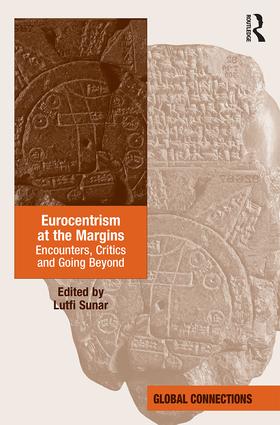EUROCENTRISM AT THE MARGINS: ENCOUNTERS CRITICS AND GOING BEYOND
- Post by: Lütfi Sunar
- Mayıs 29, 2020
- Comments off

Editor: Lutfi Sunar
Publisher: Routledge
Published May 20, 2016
238 Pages – 2 B/W Illustrations
Eurocentrism remains a prevailing feature of Western-dominated social scientific perspectives, tending to ignore alternative views originating outside the West and thus maintaining a form of scholarly hegemony. As such, there is an urgent need to reconsider Eurocentrism in social science, to ask whether it constitutes an obstacle to understanding social problems and whether it is possible to go beyond Eurocentrism in the construction of reliable, more universal knowledge. At the same time, certain questions persist, particularly with regard to the extent to which recent revisionist challenges have really contributed to the surmounting of Eurocentric domination, and whether the constant repetition of the concept serves to reinforce it. This book engages with the central problems of Eurocentrism in the social sciences, bringing together the work of scholars from around the world to offer a critique of this perspective from both European and non-European positions, thus shedding light on the binaries that often come into being in debates in this field. Thematically organised and addressing a range of questions, including Eurocentrism in historical studies, in the understanding of religion and civilisation and in the study of international relations, as well as in the institutionalisation and professionalisation of research and discourses on modernisation in the Middle East, Eurocentrism at the Margins will appeal to scholars with interests in knowledge production and circulation, and Eurocentrism and post-colonialism in the social sciences.
Preface
Introduction: marginalizing Eurocentrism: critics and encounters in the contemporary social structures, (Lutfi Sunar and Firdevs Bulut)
Part I From History to Society
1. The constitution of Eurocentric modernity and the changing position of the other, (Lutfi Sunar)
2. Historical view of Islam in the wake of Eurocentric history, (Mustafa Demirci)
3. ‘Eurocentrism inside Europe’: Eurocentric progressivism in historiography of the eighteenth century Habsburg Monarchy and Russian Tsardom, (Yasir Yılmaz)
Part II Producing Knowledge:
4. Religion and concept formation: transcending Eurocentrism, (Syed Farid Alatas)
5. Academic (in)dependency in the Arab world and Latin America: a comparative perspective, (Sari Hanafi and Rigas Arvanitis)
6. Eurocentrism in higher education in Turkey: locality and universality in textbooks on sociology of education, (Bekir S. Gür, Zafer Çelik and Coşkun Tastan)
Part III Encounters: The rise, fall, and recent revival of Eurocentrism in international relations theory, (Hasan Basri Yalçın)
7. A twofold negligence and contention in Eurocentrism: a critical view on the case of Seyed Hossain Nasr’s sacred science, (Khosrow Bagheri Noaparast)
8. The Eurocentric understanding of Turkish modernization and the alternative of social history literature, (İsmail Çağlar)
Conclusion: criticizing Eurocentrism: limitations and alternatives, (Kerem Karaosmanoğlu and Defne Karaosmanoğlu)
Index.
“Eurocentrism continues to be a pervasive influence in the social and human sciences. Anyone interested in understanding it and pursuing alternatives, will find this collection of wide-ranging chapters invaluable."
Gerard Delanty, Sussex University, UK
“This is a challenging, learned, and ambitious multi-authored book by international scholars concerned with the dominant role of Eurocentrism in thinking about problems. The various chapters display a keen grasp of, and a fair evaluation of, the controversial literature on the subject. Even more, readers will be interested in the proposed new multidisciplinary research that the authors hope will lead to a more exhaustive critique of Eurocentrism."
Michael Curtis, Rutgers University, USA
“This volume makes a valuable contribution to the growing literature on Eurocentrism. The book, by considering Eurocentrism from the margins of Europe, brings both analytical rigour and imaginative insights to the project of decolonizing knowledge. This varied and rich collection of essays not only critiques Eurocentrism but also proposes a range of alternatives, and will no doubt reward further study for years to come."
Salman Sayyid, University of Leeds, UK
